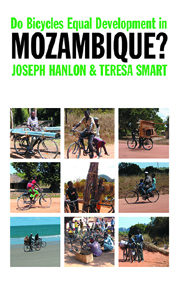Book contents
- Frontmatter
- Contents
- Acknowledgements
- The authors
- Money & measurements
- Abbreviations, acronyms & glossary
- Part I IS THERE DEVELOPMENT IN MOZAMBIQUE?
- 1 Introduction: more bicycles, but …
- 2 A brief history: war, peace & slow recovery
- 3 Can peasants pull Nampula out of poverty?
- 4 The Manica miracle is over
- 5 Cashew: from disaster to export model
- 6 Tobacco: hard choices
- 7 Has poverty decreased?
- 8 Is there development in Mozambique?
- Part II ACTORS & CONTEXT
- Part III ALTERNATIVES & THE DEVELOPMENTAL STATE
- Appendix 1 Aid
- Appendix 2 Investment & other tables
- Bibliography
- Index
6 - Tobacco: hard choices
from Part I - IS THERE DEVELOPMENT IN MOZAMBIQUE?
Published online by Cambridge University Press: 05 April 2013
- Frontmatter
- Contents
- Acknowledgements
- The authors
- Money & measurements
- Abbreviations, acronyms & glossary
- Part I IS THERE DEVELOPMENT IN MOZAMBIQUE?
- 1 Introduction: more bicycles, but …
- 2 A brief history: war, peace & slow recovery
- 3 Can peasants pull Nampula out of poverty?
- 4 The Manica miracle is over
- 5 Cashew: from disaster to export model
- 6 Tobacco: hard choices
- 7 Has poverty decreased?
- 8 Is there development in Mozambique?
- Part II ACTORS & CONTEXT
- Part III ALTERNATIVES & THE DEVELOPMENTAL STATE
- Appendix 1 Aid
- Appendix 2 Investment & other tables
- Bibliography
- Index
Summary
Tobacco is Mozambique's largest agricultural export, rising from $11 m. in 2003 to $109 m. in 2006, and now exceeding sugar, prawns, cotton or cashew (see Table 6.1). Mozambique has become the world's fifth largest producer of burley tobacco. Promotion of tobacco growing by international companies has done more to raise peasant incomes than any similar post-war action. But tobacco is highly controversial, on grounds of health and long-term potential, because of the way it also squeezes peasant households, and because of a complex local trade-off between industrial and agricultural development.
Profiting from death
‘Tobacco is the second major cause of death in the world. It is currently responsible for the death of one in ten adults worldwide (about 5 million deaths each year)’, says the World Health Organisation. By 2030 it is expected to kill 10 million people per year, most of them poor and in developing countries. Mozambique was one of the first countries, on 18 June 2003, to sign the WHO Framework Convention on Tobacco Control, although it has never ratified it. The Convention requires signatories to take ‘measures to reduce the demand for tobacco’. Signatory countries agree, ‘as a minimum, [to] prohibit all forms of tobacco advertising’. Legislation to do this was introduced in 2007. But Article 17 of the Convention commits all signatories to cooperate to promote ‘economically viable alternatives’ for tobacco growers. Since Mozambique signed, the number of growers has increased substantially and this rapid growth is continuing, as tobacco has become one of the most profitable peasant cash crops.
- Type
- Chapter
- Information
- Do Bicycles Equal Development in Mozambique? , pp. 51 - 56Publisher: Boydell & BrewerPrint publication year: 2008



